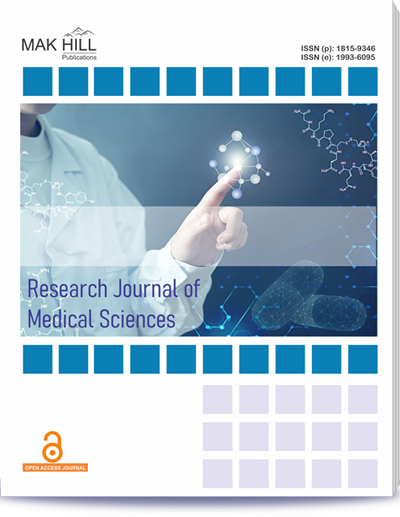
Research Journal of Medical Sciences
ISSN: Online 1993-6095ISSN: Print 1815-9346
189
Views
21
Downloads
Role of Postoperative Glycemic Control in Reducing Surgical Site Infections in Diabetic Patients Undergoing Abdominal Surgery
Ramesh Lingala, C.H. Santhosh Babu, Srikanth Jukuru and Praveen Mangalagiri
Page: 68-73 | Received 20 Apr 2024, Published online: 05 Jun 2024
Full Text Reference XML File PDF File
Abstract
Surgical site infections (SSIs) are a significant complication following abdominal surgery, particularly in diabetic patients who are inherently at higher risk due to impaired immune responses and poor wound healing associated with hyperglycemia. This study aimed to evaluate the role of postoperative glycemic control in reducing the incidence of SSIs in diabetic patients undergoing abdominal surgery. This prospective cohort study was conducted at the Department of Surgery, Government Medical College, Nalgonda, Telangana, over one year. A total of 75 diabetic patients undergoing elective abdominal surgery were enrolled. Postoperative blood glucose levels were monitored at 6‐hour intervals for the first 48 hours, then daily until discharge. The primary outcome measure was the incidence of SSIs, monitored on postoperative days 7, 14 and 30. Data were analyzed using SPSS version 25.0, with logistic regression analysis to identify independent predictors of SSIs. The mean age of the participants was 55.3±10.7 years, with 53.3% being male. Type 2 diabetes was present in 80.0% of patients, with a mean diabetes duration of 12.5±7.8 years. The mean preoperative HbA1c level was 8.2±1.5%. Postoperative glycemic control improved progressively, with 93.3% of patients achieving target blood glucose levels (80‐180 mg/dL) by discharge. The overall incidence of SSIs was 16.0% by postoperative day 30, with a significant reduction observed in patients who maintained blood glucose within the target range. Maintaining stringent postoperative glycemic control significantly reduces the incidence of SSIs in diabetic patients undergoing abdominal surgery. These findings highlight the importance of regular blood glucose monitoring and tailored insulin therapy in the preoperative management of diabetic patients. Future research should focus on larger, multi center trials to validate these findings and explore the impact of advanced glycemic control technologies.
How to cite this article:
Ramesh Lingala, C.H. Santhosh Babu, Srikanth Jukuru and Praveen Mangalagiri. Role of Postoperative Glycemic Control in Reducing Surgical Site Infections in Diabetic Patients Undergoing Abdominal Surgery.
DOI: https://doi.org/10.36478/10.36478/makrjms.2024.7.68.73
URL: https://www.makhillpublications.co/view-article/1815-9346/10.36478/makrjms.2024.7.68.73